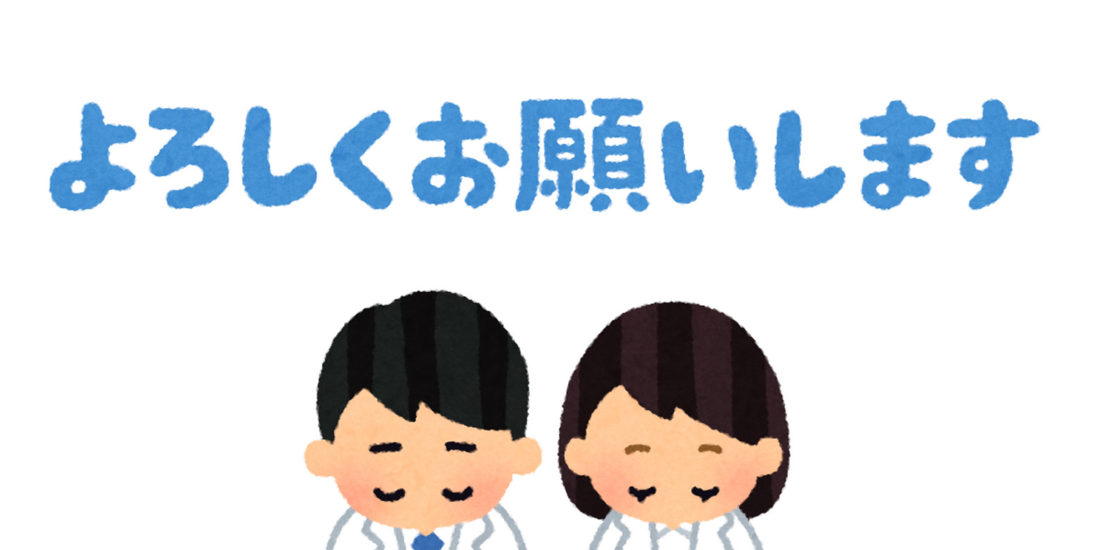“Yoroshikuonegaishimasu.” (よろしくお願いします) You use it in introductions, at the end of emails, and when requesting a service–but what does it really mean?

Please And Thank You: The Meaning Of The Mysterious Yoroshiku Onegaishimasu
It’s hard to give one single definition for the expression, because the meaning changes depending on the situation. Let’s start by looking at an example of when you might use “yoroshikuonegaishimasu.”
Introductions
One thing you will definitely need to do in Japan, whether you are here to study, work, or raise a family, is to introduce yourself. Here’s an example of a first time meeting between me and a colleague named Saitou.
Me: Hajimemashite. Salmon desu. Yoroshiku onegaishimasu.
Saitou: Saitou desu. Yoroshiku onegaishimasu.
Me: Nice to meet you! I’m Salmon. Yoroshiku onegaishimasu.
Saitou: I’m Saitou. Yoroshiku onegaishimasu.
Notice that both Saitou and I said “yoroshikuonegaishimasu.”
Starting Your Workday
You will often use yoroshiku onegaishimasu at the beginning of the workday. For example, when I clock in at my part time job (アルバイト), I start by greeting my colleagues.
Me: Ohayogozaimasu. Kyou mo yoroshiku onegaishimasu.
Co-worker: Yoroshiku onegaishimasu.
Me: Good morning. Yoroshikuonegaishimasu for today.
Co-worker: Yoroshikuonegaishimasu.
Again, both people said “yoroshiku onegaishimasu.”
Fun fact: It’s always morning on the job! (No matter what time it is, the first time colleagues see each other that day, they say “ohayogozaimasu.”)

What Does Yoroshiku Onegaishimasu Mean?
So, now, on to the meaning. As I was researching for this article, I noticed yoroshiku onegaishimasu is sometimes translated as, “Please treat me well.” In English, that’s really weird, so let’s not translate it literally. Broadly speaking, “yoroshiku onegaishimasu” is a humble acknowledgement that at some time in the future you will inevitably 1) cause the other person some inconvenience or 2) be put in a situation where you need to ask for his or her help. This means that yoroshiku onegaishimasu contains both an element of “please” (similar to plain “onegaishimasu”) and an element of “thank you” (like “arigatougozaimasu”). That might sound a little confusing, but it helps to consider the difference between yoroshiku onegaishimasu and arigatougozaimasu.
Arigatougozaimasu: thanks for something that has already been done
Yoroshiku onegaishimasu: thanks for something that will be done in the future
When both people say it, they are acknowledging their dependence on each other to create a good relationship, which is important in a collectivist society!

When To Use Yoroshiku onegaishimasu
In A Business Context
Because status plays a major role in Japanese society, the nuances of yoroshiku onegaishimasu vary a bit depending on your relationship to the other person.
If you say it to your superiors, you are committing to work hard for them.
When your superiors say it to you, they are 1) counting on you and sometimes 2) committing to look after you.
With your equals, it means, “Let’s work hard together for the good of all.”
Making a Request
Yoroshiku onegaishimasu is used for making requests. For example, when a business offers a service or advertises a new product, they say to mean, “Here’s the info! Check it out!”
A mom leaving her child at day care says it to the day care teacher, meaning, “Sorry if he cries a lot or throws a tantrum or has a stinky diaper! Thank you so much for dealing with it all!”
Your colleague might ask you to do a project and say it to mean, “Thanks for doing this for me. I’m counting on you!”
Note: In the business context, if someone asks you to do something and says yoroshiku onegaishimasu, you can use the formal reply, “Kashikomarimashita,” (かしこまりました) which means “got it,” or, “Shouchi-itashimashita,” (承知いたしました) which means “understood.”
Sending Regards
The short version of yoroshiku onegaishimasu is yoroshiku. This is used to send people your regards.
Informal: Obaachan ni yoroshiku-ne!
(“Tell your grandma I said hi!”)
Formal: Etsuko-san ni yoroshiku otsutae kudasai.
(“Please give my regards to Etsuko.”)
In Emails
Emails usually end with yoroshiku onegaishimasu. The English equivalent here would probably be “sincerely.”
In Seasonal Greetings
“Akemashite omedetougozaimasu. Kotoshi mo yoroshikuonegaishimasu.”
(Happy New Year! This is going to be a great year if we help each other!)
Variations Of Yoroshiku onegaishimasu
“Yoroshiku” (casual)
“Yoroshiku onegaishimasu” (polite)
“Yoroshiku onegaiitashimasu” (honorific)
You can also add words to the front of the phrase for added politeness or to match the situation.
“Kochirakoso yoroshikuonegaishimasu”
(This is a response to someone else’s “yoroshikuonegaishimasu,” meaning something along the lines of, “Oh, no, no. What can I possibly do to help you? It’s me who will be asking you for help!”)
“Zehitomo yoroshikuonegaishimasu”
(“By all means!”)
“Nanitozo yoroshikuonegaishimasu”
(This is used in written Japanese, often in emails.)
“Kongotomo or korekaramo yoroshikuonegaishimasu”
(“From now on”)
“Hikitsuzuki yoroshikuonegaishimasu”
(This is used for an already established relationship that is going to continue. My job search agent said this to me when our first face-to-face meeting was finishing up.)
Take Excellent Care Of Her!
There are probably endless instances where the phrase yoroshiku onegaishimasu can be used, because in Japan, it’s absolutely necessary to be polite and avoid inconveniencing others. To finish off this article, though, here is one final example taken from the (until recently) popular reality TV show, Terrace House.
Terrace House features six perfect strangers in their late teens to early thirties who move into a fabulous house together. Commentators watch the drama unfold as the individuals pursue their various dreams, have fun dinners together, annoy each other with their housekeeping (or unkeeping) habits, and form relationships. In the Karuizawa season, part-time fashion model Shion is interested in Tsubasa, a professional hockey player. They go for a lunch date at Tsubasa’s dad’s soba shop, and afterwards, as Shion is paying and thanking her jolly dad for the delicious noodles, her dad says, “Tsubasa no koto, yoroshikuonegaishimasu.”
What did he mean? In so many words, “You have my permission to go out with my precious daughter. Make sure you take excellent care of her!”
Over To You
“Yoroshikuonegaishimasu” might have seemed like a mysterious phrase before, but I hope that now you have the confidence to use it the next time the occasion arises!
When have you heard or used this phrase before? What other variations are there? How would you explain the meaning? Let us know in the comments!



